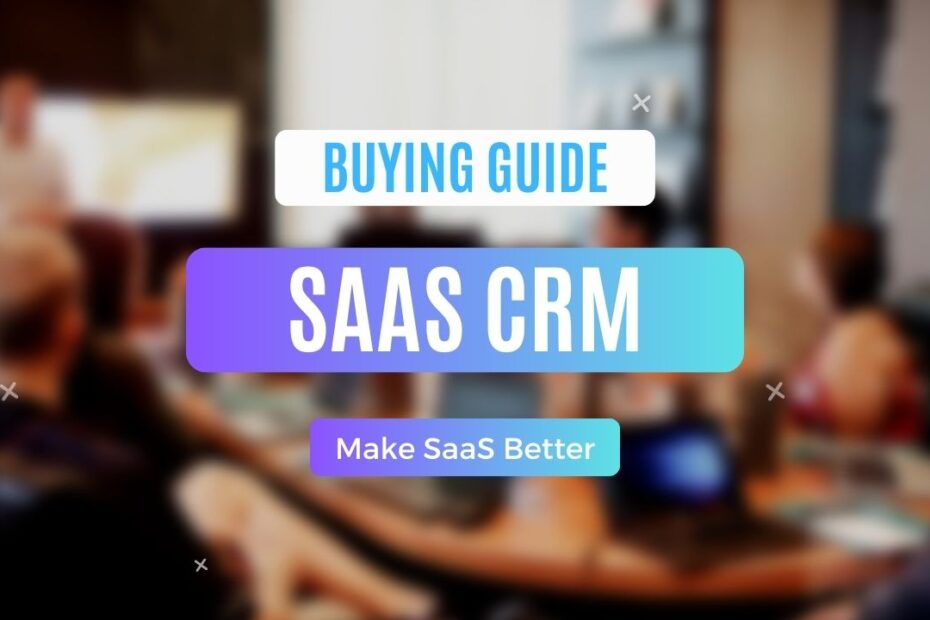No matter what a company does or how many employees it accommodates, “customer is the king” is a motto that has surpassed ages and is still ruling. In this modern age, managing customer relationships is not a one man’s job. It is difficult but is the one job that needs to be flawless. This is where SaaS CRM (Customer Relationship Management) platforms step in.
According to a recent study, businesses that implement CRM systems experience, on average, a 29% increase in sales revenue and a 34% boost in sales productivity. If you are wondering what exactly a SaaS CRM Software tool is and which tool is best for your business needs, this article is for you. Keep on reading…
What Is SaaS CRM?
SaaS CRM, or Software as a Service Customer Relationship Management, is a cloud-based software solution that enables businesses to manage their interactions and relationships with customers and prospects. It helps in streamlining customer interactions, improving sales processes, and enhancing overall business performance.
Unlike traditional CRM systems, which are typically installed locally on a company’s servers and require ongoing maintenance and updates, SaaS CRM is hosted in the cloud and accessed via the internet.
Curious to know the benefits of SaaS CRM in detail? Here we have them as follows:
What Are the Benefits of SaaS CRM?
1. Accessibility
SaaS CRM allows users to access the platform from anywhere at any time. This helps users stay connected and productive regardless of their location, whether they’re in the office, working remotely, or on the go. Users need not worry about sacrificing access to critical customer data or communication tools.
2. Scalability
Scalability is beneficial due to its ability to adapt to the changing needs and growth of businesses. Whether a company is hiring new employees or experiencing fluctuations in staffing levels, they can seamlessly adjust the number of user licenses without the need for additional hardware or software installations.
3. Affordability
Since SaaS CRM operates on a subscription-based pricing model, the need for large upfront investments in software licenses, infrastructure, and hardware is eliminated. Thus the tool is more affordable for businesses, especially smaller ones with limited capital.
4. Automatic Updates
Automatic updates ensure that the CRM software is always up-to-date with the latest security patches, reducing the risk of data breaches or cyber attacks. This also means minimized downtime associated with maintenance activities.
5. Integration
SaaS CRM systems can easily integrate with other software solutions allowing for seamless data flow, reduced risk of errors and thus improved efficiency, faster decision-making and more agile responses to changing market conditions.
Now that we have an idea of some of the most significant benefits of SaaS CRM tools, let’s take a look at the best SaaS CRM software tools for 2024.
Top 10 SaaS CRM Software Tools for 2024
1. HubSpot CRM
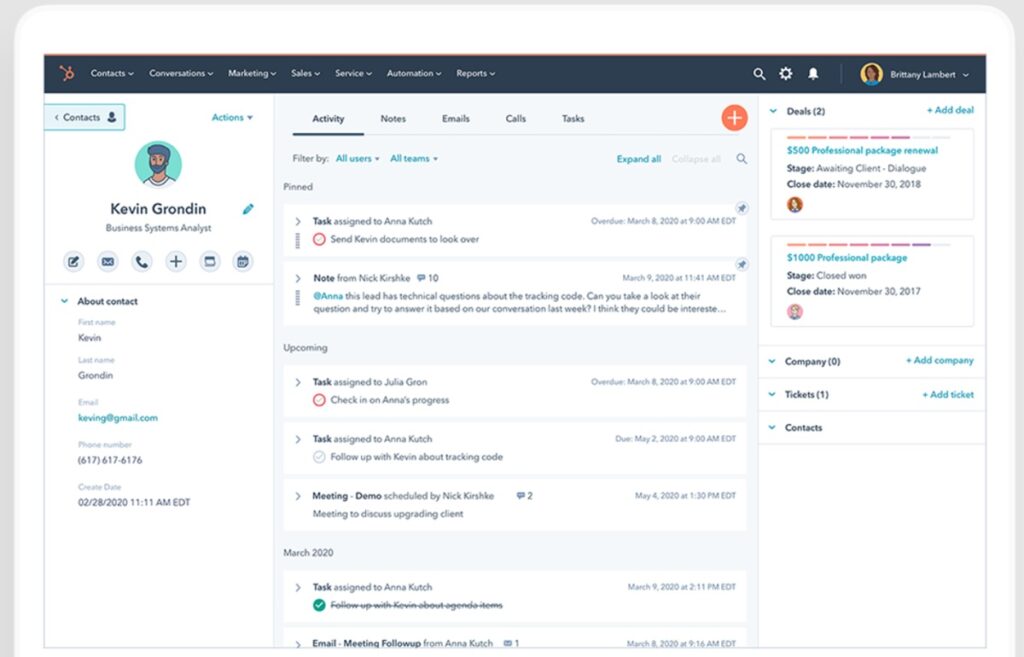
HubSpot CRM is known for its user-friendly interface and robust features. It caters primarily to small and medium-sized businesses seeking an all-in-one solution for managing customer relationships.
It offers a comprehensive suite of tools designed to streamline sales, marketing, and customer service processes, making it an ideal choice for businesses looking to centralize their operations and drive growth.
Key features of HubSpot CRM are contact management, email tracking, task automation, and pipeline management, empowering users to track interactions with leads and customers effectively. Its intuitive dashboard provides real-time insights into sales performance, enabling businesses to make data-driven decisions and optimize their sales funnel.
HubSpot CRM offers a free version with limited features, making it accessible to businesses of all sizes. For more advanced functionality, users can upgrade to paid plans such as the Sales Hub, Marketing Hub, or Service Hub, which offer additional features and scalability to meet growing business needs. Pricing for paid plans varies based on the selected features and the size of the user’s organization.
For individuals and small teams, the CRM suite starts at $20 per month.
2. Salesforce CRM
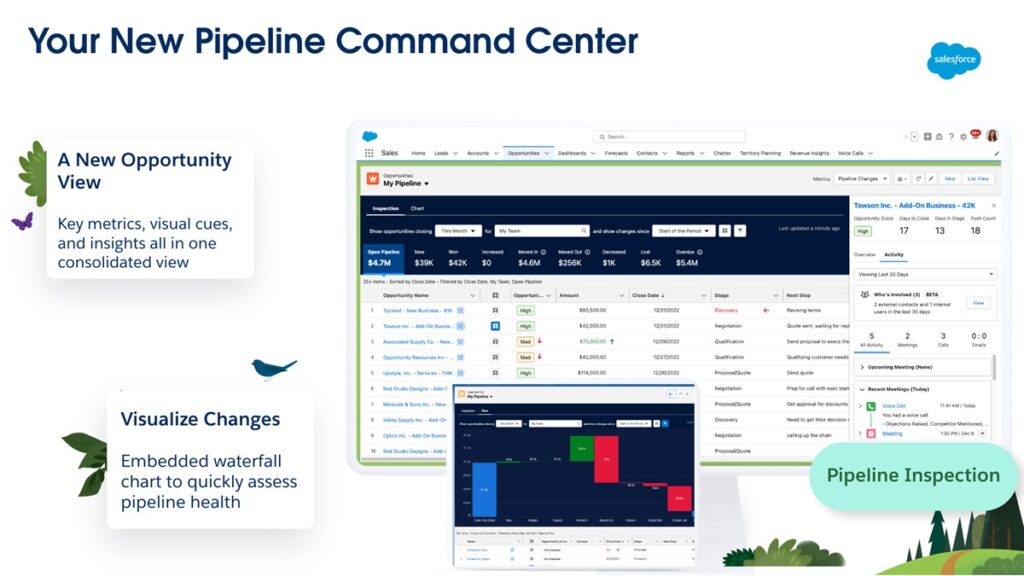
Salesforce CRM is one of the most comprehensive and widely-used customer relationship management (CRM) tools globally. It caters to businesses of all sizes across various industries.
Salesforce is particularly known for its cloud-based platform, which allows users to manage customer relationships, track sales leads, and automate marketing campaigns efficiently.
Its key features include customizable dashboards and reports for real-time insights, lead and opportunity management tools for sales teams, and workflow automation to streamline processes. It also offers robust customer support functionalities, including case management and knowledge base integration and AI-powered analytics and forecasting to help businesses make data-driven decisions.
While Salesforce offers a variety of pricing plans tailored to different business needs, it is primarily a paid service. However, Salesforce does provide a free trial option for new users to explore its features and functionalities before committing to a subscription.
Paid plans start at $25 per user/month.
3. Microsoft Dynamics 365
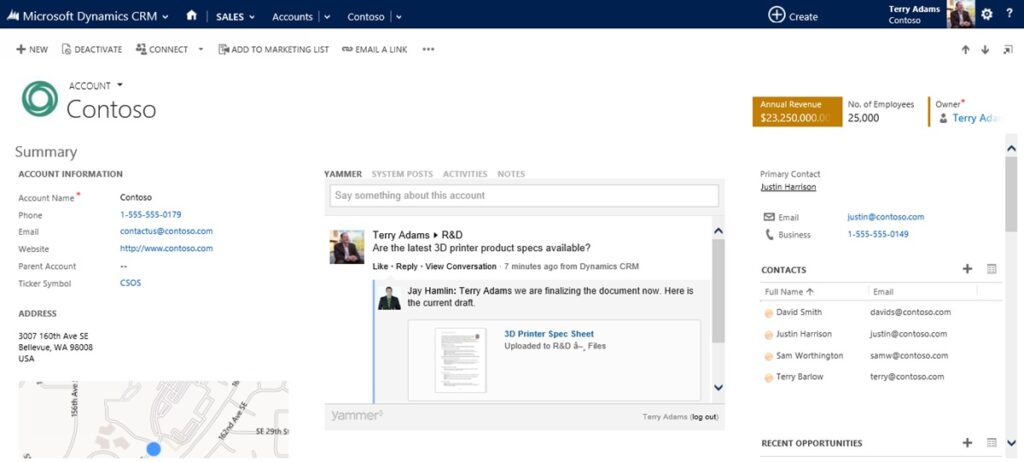
Microsoft Dynamics 365 CRM stands out for its wide-ranging customer relationship management solutions tailored for businesses of all sizes and sectors. Its strength lies in its smooth integration with Microsoft’s suite of products, providing a cohesive platform for sales, marketing, and customer service tasks.
The platform targets organizations aiming to bolster customer engagement, refine sales strategies, and streamline operational workflows.
Among its notable features are robust tools for managing leads and opportunities, customizable sales pipelines, and AI-powered analytics for informed decision-making. Its marketing automation tools empower users to execute targeted campaigns and deliver personalized customer experiences, while its customer service functionalities ensure efficient case handling and resolution.
Integrating seamlessly with Microsoft’s ecosystem, including Office 365, Outlook, and Power BI, Dynamics 365 CRM amplifies productivity and fosters collaboration throughout the organization.
The platform operates on a subscription-based model, with various pricing tiers catering to diverse business requirements. While basic functionalities might be available for free, more advanced features and capabilities typically necessitate a paid subscription.
Paid plan starts at $65 per user/month.
4. ClickUp
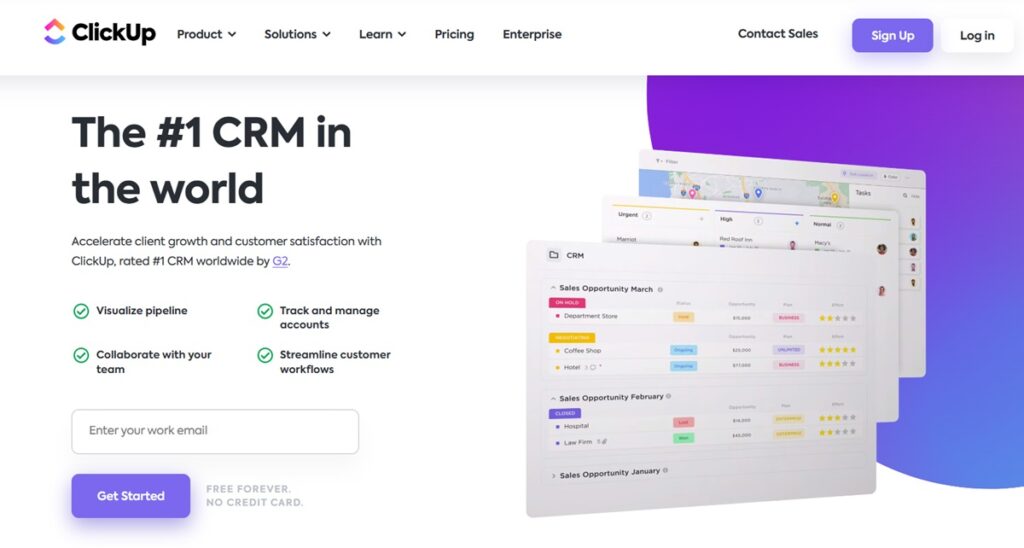
ClickUp is a versatile project management and productivity tool known for its customizable features and user-friendly interface. Primarily catering to businesses of all sizes, from small startups to large enterprises, ClickUp provides an ideal solution for organizing tasks, managing projects, and collaborating with teams.
Some of the significant features of ClickUp include customizable task lists, time tracking, file sharing, and built-in communication tools like comments and chat. Sales teams can use it to visualize the pipeline, create customer databases, and analyze customer insights. Users can create custom workflows, set reminders, and automate repetitive tasks to streamline their work processes.
ClickUp offers both free and paid plans, with the free plan providing basic features and limited storage. Paid plans include additional features such as unlimited storage, advanced reporting, and integrations with third-party apps.
Pricing tiers are based on the number of users and start at $10 per user/month, making ClickUp accessible to businesses of all budgets.
5. Zendesk Sell
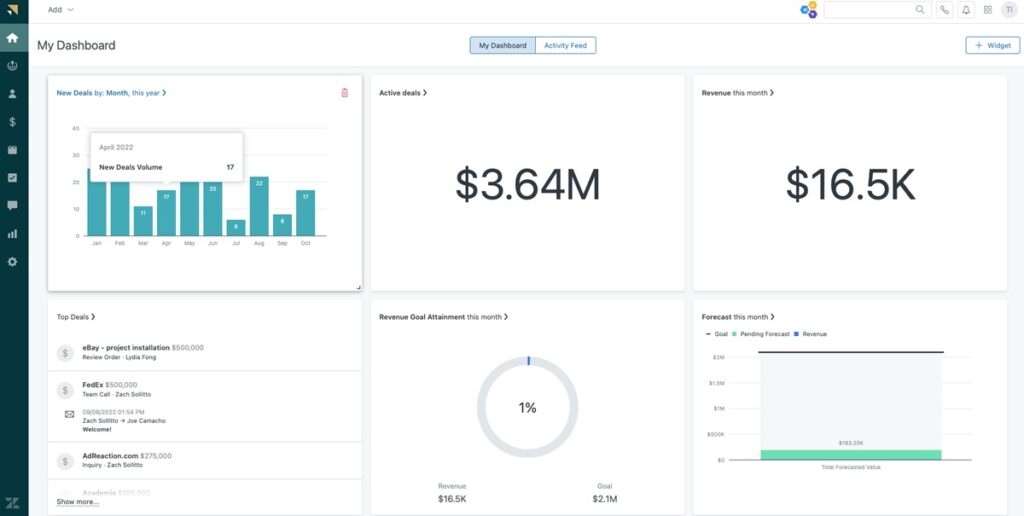
Zendesk Sell is a popular CRM tool known for its intuitive interface and suitability for small to midsize businesses. It caters to sales teams seeking a streamlined solution for managing leads, contacts, and deals effectively.
With its user-friendly design and customizable workflows, Zendesk Sell empowers sales professionals to track interactions, prioritize tasks, and close deals more efficiently.
Robust contact management, pipeline visualization, and sales automation tools are some of the key features of Zendesk Sell. Its built-in reporting and analytics capabilities provide valuable insights into sales performance, helping teams identify trends and optimize their strategies.
Zendesk Sell offers both free and paid plans, with pricing tiers tailored to the needs of different businesses. The free plan provides basic CRM functionality, while paid plans offer additional features such as advanced reporting, email tracking, and integrations with third-party apps.
Pricing is based on a per-user, per-month subscription model, making it scalable and affordable for growing businesses. Paid plan starts at $25 per user/month.
6. Monday Sales CRM
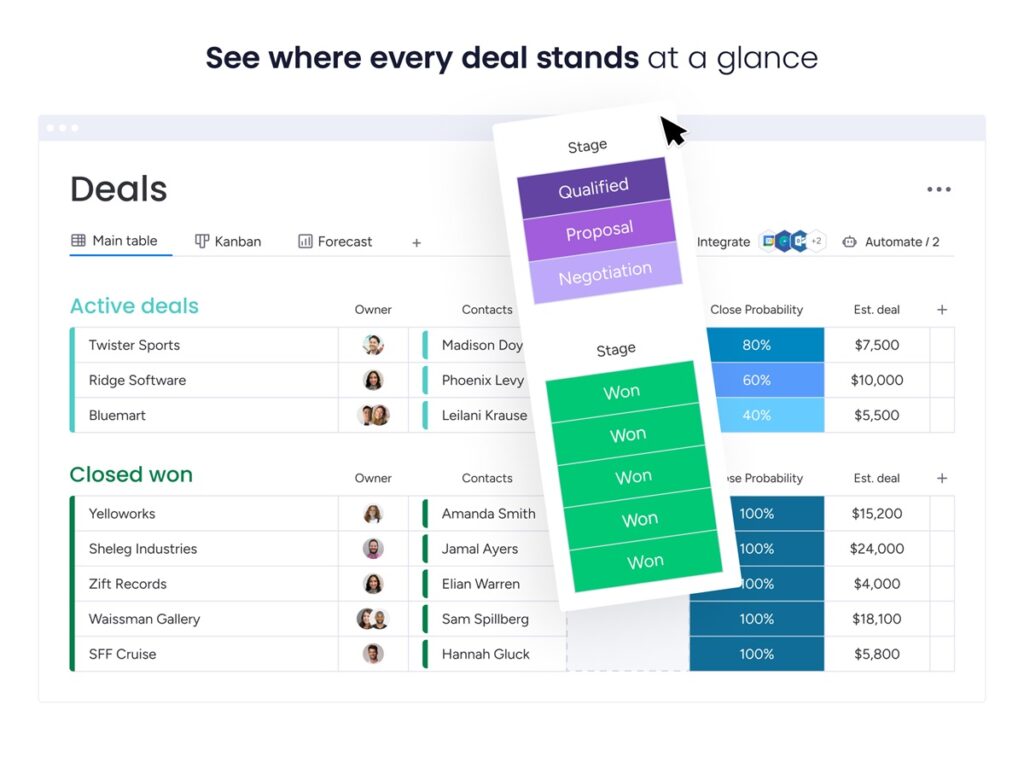
Monday Sales CRM is renowned for its user-friendly interface and customizable workflows, catering primarily to sales teams and professionals across various industries. With its intuitive design and flexibility, it offers a seamless solution for managing leads, contacts, deals, and pipelines, empowering users to streamline their sales processes and boost productivity.
Key features of Monday Sales CRM include customizable pipelines, drag-and-drop functionality, activity tracking, email integration, and reporting tools. Users can easily visualize their sales pipelines, prioritize leads, and track interactions, ensuring nothing falls through the cracks. Additionally, it offers automation capabilities, such as email sequences and reminders, to streamline repetitive tasks and improve efficiency.
While Monday offers various pricing plans tailored to different business needs, including a free trial, the CRM functionality is available as part of their paid plans, starting at $15 per month/user. This pricing structure provides flexibility for businesses of all sizes to access the features they require to drive sales success.
7. Pipedrive
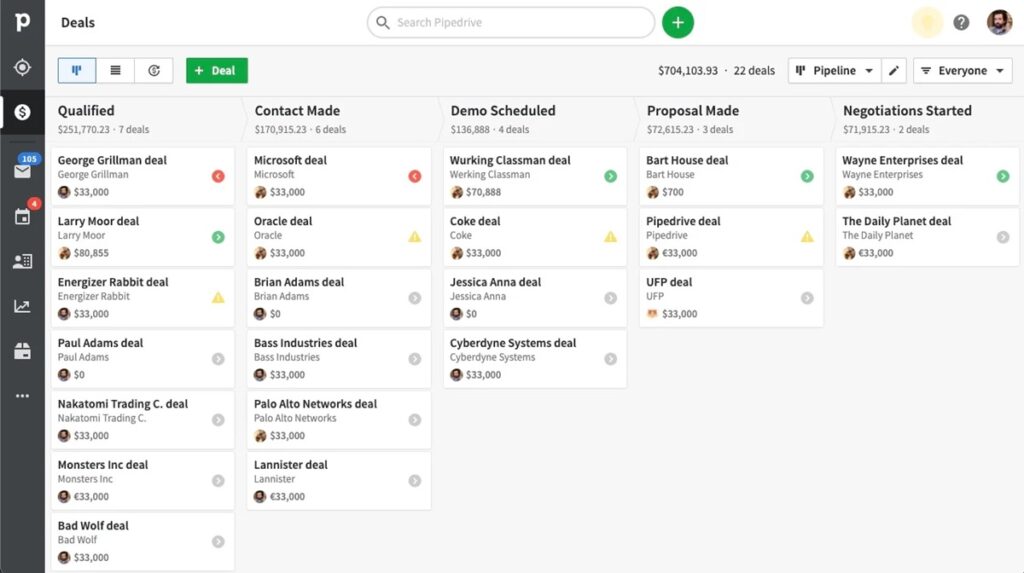
Pipedrive stands out as a widely-used CRM solution renowned for its user-friendly approach in managing sales pipelines, primarily catering to small and medium-sized businesses (SMBs) and sales teams.
Its hallmark features encompass customizable pipelines facilitating intuitive sales process management. Alongside robust contact and lead management, Pipedrive seamlessly integrates email functionalities and automation tools, streamlining workflows for enhanced productivity.
The platform also offers comprehensive reporting and analytics capabilities, empowering users to monitor sales performance and pinpoint areas for improvement. Complementing its core functionalities, Pipedrive boasts extensive integrations with various third-party applications, spanning email marketing platforms such as Mailchimp, communication tools like Slack, and productivity suites such as Google Workspace.
While users can avail themselves of a free trial, Pipedrive operates on subscription-based pricing models, with plans tailored to individual users and scalable options for larger teams. Its paid plans start at $11.90 per user/month.
8. Zoho CRM
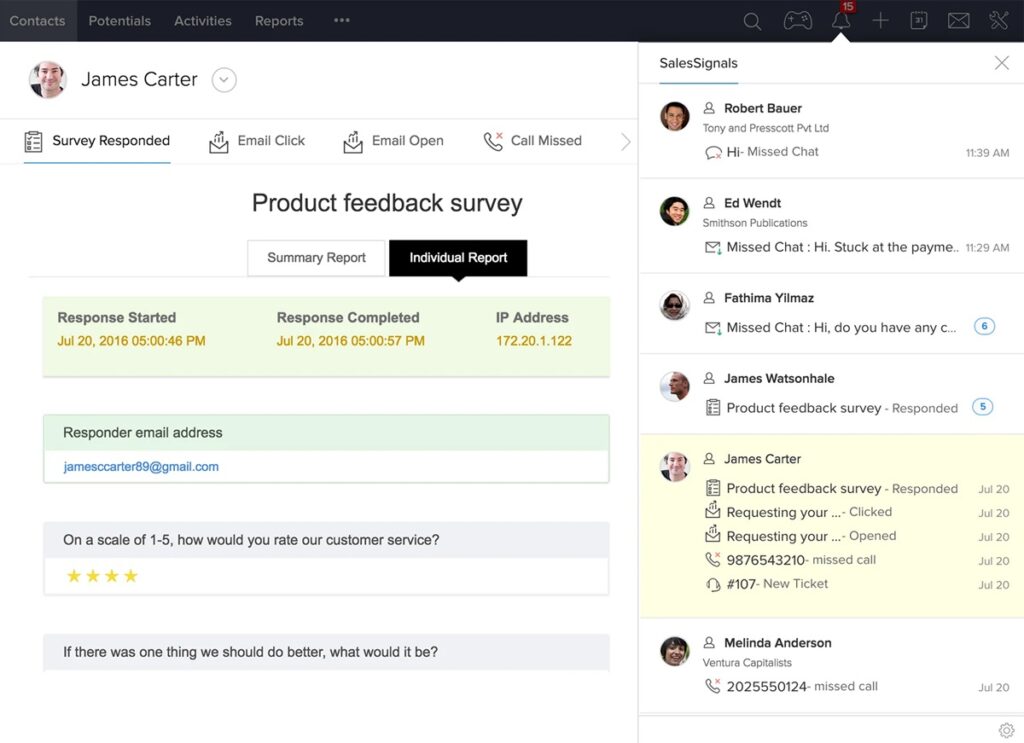
Zoho CRM stands out as a top-tier customer relationship management (CRM) solution, lauded for its intuitive interface and extensive functionalities. It caters to a diverse range of businesses, spanning from fledgling startups to established enterprises, all seeking efficient management of customer interactions and sales processes.
Core functionalities of Zoho CRM encompass lead and contact administration, sales pipeline monitoring, automated email marketing, and in-depth reporting and analytics.
Additionally, it boasts advanced tools like workflow automation, AI-driven sales projections, and seamless integration with social media platforms, empowering businesses to engage customers across various channels and propel sales performance.
Zoho CRM seamlessly integrates with popular business applications such as G Suite, Microsoft Office 365, and Mailchimp, offering enhanced versatility and connectivity.
While a free version with basic features is available, organizations desiring access to its full suite can opt for paid plans starting from $14 per user/month, ensuring affordability without compromising on robust CRM capabilities.
9. SugarCRM
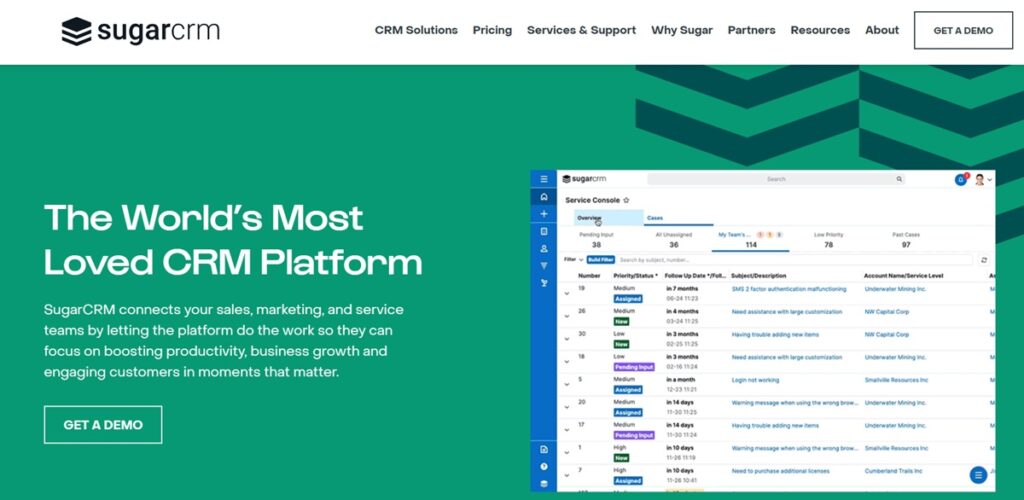
SugarCRM is recognized for its highly flexible and customizable CRM solution, serving businesses of all sizes and industries. It’s particularly valued by organizations seeking adaptability in their CRM platform, tailored to their specific workflows and needs.
The platform offers robust features including contact and lead management, sales automation, marketing campaign tracking, and customer support ticketing. Its user-friendly interface and extensive customization options empower users to create personalized experiences for their customers while streamlining internal operations.
Sugar CRM also provides comprehensive analytics and reporting tools to guide data-driven decision-making and optimize sales and marketing strategies.
Moreover, Sugar CRM seamlessly integrates with a variety of third-party applications such as Microsoft Outlook, Google Workspace, and Mailchimp.
While paid plans offer advanced features and support starting at $49 per user/month, the platform also offers a free, open-source version known as Sugar Community Edition, ensuring accessibility for businesses with diverse budgets and requirements.
10. Nimble
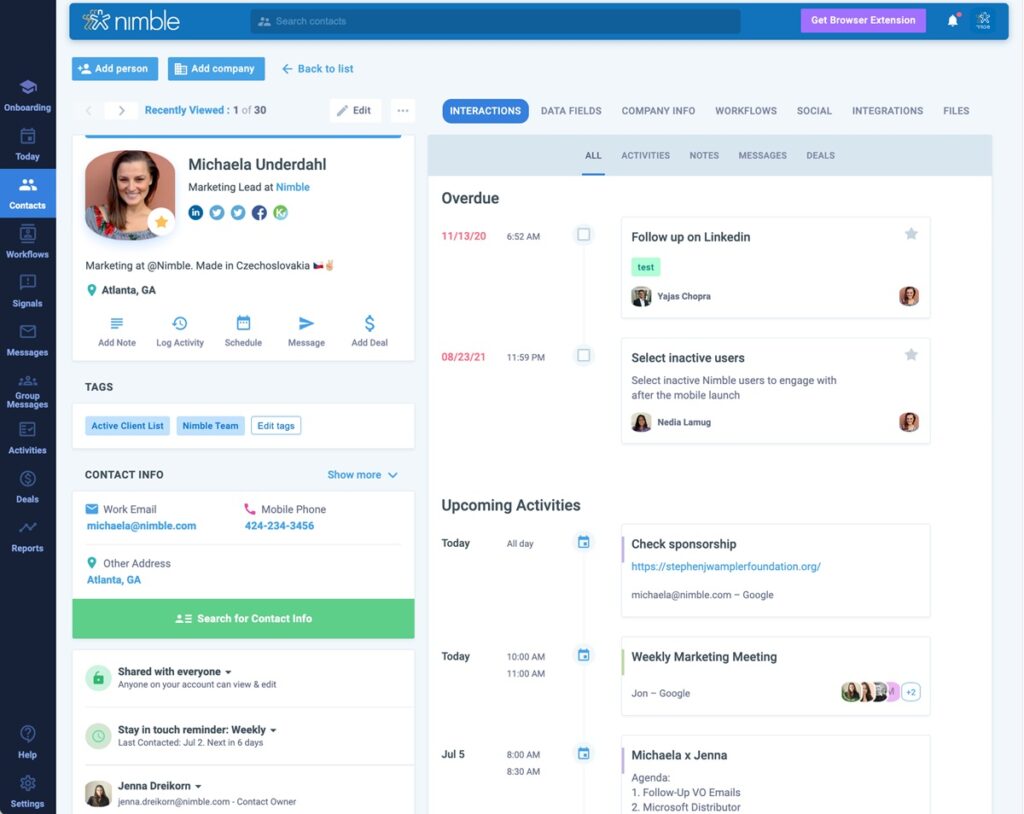
Nimble is a popular CRM tool known for its emphasis on social media integration and relationship management. It caters to small and medium-sized businesses seeking to streamline their contact management and engagement processes across various platforms.
Nimble consolidates contact information, social media interactions, and communication histories into a unified platform, making it easier for users to nurture and maintain customer relationships effectively.
Key features of Nimble include contact management, email tracking, social media integration, and sales pipeline management. It automatically enriches contact profiles with social media insights, providing valuable context for interactions.
Nimble also offers email templates, scheduling, and tracking functionalities to streamline communication efforts. Additionally, its intuitive interface and customizable dashboard enhance user experience and productivity.
While Nimble offers a free 14-day trial, it primarily operates on a subscription-based pricing model, with paid plans starting at $29.90 per user/month. This pricing structure allows businesses to choose the plan that best suits their needs and scale as they grow.
Bonus Tool – GorillaDesk

GorillaDesk is a specialized CRM built for field service professionals, particularly pest control, lawn care, and pool service businesses. It streamlines scheduling, invoicing, and customer management, offering a complete solution for small businesses looking to optimize their operations.
With features like route optimization, automated reminders, and mobile access, GorillaDesk ensures field teams stay organized and productive on the go. Its user-friendly interface and robust functionality make it a favorite among field service professionals who need an all-in-one platform to manage both customer relationships and operational logistics.
Select the Right CRM for Your Needs
In today’s dynamic business landscape, SaaS CRM tools have become indispensable for organizations striving to thrive in a customer-centric environment. Offering accessibility, scalability, and seamless integration, these tools empower businesses to streamline customer interactions, boost sales revenue, and enhance overall satisfaction.
With the ever-growing emphasis on personalized experiences and data-driven decision-making, SaaS CRM solutions serve as essential assets, enabling companies to adapt, grow, and succeed in an increasingly competitive market.
😎 Also read some of our best pieces related to SaaS CRM –
SaaS Sales 101: A Beginner’s Guide for 2024
20 Best SaaS Tools for Businesses in 2024
18 Important Metrics SaaS Companies Should Care About
